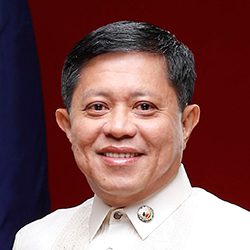SUMMARY
This is AI generated summarization, which may have errors. For context, always refer to the full article.

Last March 7, the death penalty bill hurdled the 3rd and final reading in the House of Representatives. It was a massive show of force by Speaker Pantaleon “Bebot” Alvarez who cajoled, threatened and bargained with House members.
With 217 saying yes, 54 voting no, and one abstaining, the Speaker got what he wanted.
As a neophyte member, I was appalled at how blatantly legislative rules and procedures can be set aside. Debates and enlightened discussions were swept aside with contemptuous haste.
It started with House Bill No. 01, authored by Speaker Alvarez, who wanted the repeal of RA 9346 (Death Penalty Abolition Law of 2006) and the reimposition of capital punishment for 21 offenses punishable under the Revised Penal Code and special laws under the Dangerous Drugs Act, Plunder Law, and Anti-Carnapping Act.
Referred to the justice committee, the bill went through several hearings. Resource persons from the Commission on Human Rights, International Commission of Jurists, religious groups, human rights advocates, among others, warned against the repercussions of its reimposition.
What deterrence?
For the record, the Department of Justice position paper submitted to the justice subcommittee under Rep. Vicente “Ching” Velasco claimed that the death penalty would be a deterrent against crime. But when asked for proof during the hearings, DOJ Secretary Vitaliano Aguirre II said: “I have no studies that the death penalty is a deterrent but I would be deterred if I knew I would be killed.” Committee members asked the DOJ to submit proof, which they never did.
Similarly, the PNP’s position paper states they support the death penalty because it will be a deterrent to crime. However, the PNP representative said in the hearing: “No certainty that death penalty will reduce or deter the commission of future crime, especially drugs. If we look at it just as deterrence it will fail.” The chasm between DOJ and PNP’s position papers and their actual testimony suggests that they were purposely disingenuous.
Last December 7, 2016, the justice committee of the House of Representatives approved the bill restoring the death penalty for second reading.
What was curious was that the committee approved HB 01 over the bill of Representative Robert Ace Barbers, who chairs the Dangerous Drugs House Committee that limits capital punishment only for drug-related crimes. The final version of HB 4727 ended up endorsing the bill of Barbers that was not tackled in the first place.
During the period of amendments, I motioned to refer HB 4727 back to the Committee on Dangerous Drugs under Rule 28 of our House rules, it having exclusive and primary jurisdiction. The motion ended up in the “omnibus rejection” carried out by the presiding speaker last February 28 when HB 4727 was passed on second reading by a voice vote.

As the committee substitute bill, HB 4727 was met with stiff resistance from many House members. The House leadership conducted several caucuses to stem the tide of resistance with the adept maneuvering of Majority Floor Leader Rodolfo Fariñas of Ilocos Norte.
A seasoned politician, Fariñas cajoled members into supporting the measure. Surveys were conducted, with a question that generally states: “If you are voting No, what three offenses would you suggest should only be included in the death penalty bill?”
Alvarez’s boast
Speaker Alvarez went to the extent last February 8 of saying that House leaders and committee chairs opposed to the measure would be stripped of their posts. This was a far cry from the Speaker’s tone two weeks before, when he declared: “I am very confident na maipapasa. Meron tayong coalition. Merong tayong super majority. Kung meron mang [lawmakers na] lilihis doon, siguro mga 5 or 10.” (We have a coalition. We have a super majority. If there would be dissenters, they would be probably just 5 or 10.)
When the bill was finally calendared for second reading on February 1, a deadline was imposed: it must pass the House by March 7.
Our group, the authentic minority composed of seven legislators, protested that any deadline imposed is contrary to rules on legislation and against public policy. But the majority won’t hear any of our protestations.
Representative Edcel Lagman of Albay then motioned that he is submitting a list of 50 interpellators with a partial list of 25 names. Farinas, who heads the powerful Rules Committee, received the list. There was an understanding that these legislators, most of whom are from the majority, would be allowed to interpellate.
Absence in the House
When floor debates started, there was a stark absence of House members after the calling of the rolls. Representative Lito Atienza would rise to question the quorum, a privileged motion in parliamentary procedure. There being none, the House majority was left with no option but to adjourn. This move was again disingenuously used against us – that oppositors didn’t want floor debates to happen! The majority won’t allow the “tyranny of the minority” to rule!
The first interpellator happened to be Lagman, who was the main author of the law abolishing the death penalty in 2006. Three of the sponsors, Representative Reynaldo Umali, the chairman of the Justice Committee and two vice-chairmen, Representative Fred Castro of Capiz and Representative Veloso of Leyte, would be defending its reimposition.
To our chagrin, Lagman’s interpellation was cut short by Representative Juan Pablo ‘Rimpee’ Bondoc of Pampanga, the presiding Deputy Majority Leader. It was the ruling of the Chair that only one hour was allocated for question and answer. This was sustained by a voice vote of the House even if the nayes echoed loudly in the chamber.
In just eight session days, the House Majority Leader declared a closure of the period of interpellation even if only seven legislators had taken the floor.
Aside from Lagman, those who stood up included members of the House majority such as Representative Raul del Mar of Cebu City, Representative RAV Rocamora of Siquijor, Representative Lawrence Fortun of Agusan del Norte, and Representative Kaka Bagao of Dinagat Islands. Two neophytes from the minority, Representative Harry Roque of Kabayan and myself, were given the chance to question the sponsors.
Death as retribution
What was evident during the floor debates was that the sponsors abandoned the objective of death penalty as a deterrent in the absence of evidence. They focused instead on penalty being a form of retribution.
The sponsors likewise insisted that we could invoke the Philippine Constitution to be supreme over treaty agreements and obligations with countries and organizations that are against death penalty.
For imposing death on drug-related crimes only, the compelling reasons put forward are the almost one million “surrenderers” in the war on drugs and for the extrajudicial killings to stop. What a false choice foisted on us!
Uprising
Despite the railroad and arm-twisting done by the House leadership, the opposition to the death penalty came strongly and unexpectedly with 54 voting against it.
I think the strong resistance to HB 4727 caught the House leadership by surprise.
Deluded by their sense of invincibility and riding on the high popularity of President Rody Duterte, they thought that any legislation could be rammed down legislators’ throats.
With Speaker Alvarez’ HB 02 lowering the minimum age of criminal responsibility to 9 from 15 years old to be tackled next, an uprising in the House is inevitable. – Rappler.com
Akbayan Rep. Tom Villarin is a neophyte member of the House of Representatives and part of the “authentic minority” bloc. He served as former DILG Undersecretary for Informal Settlers and Special Concerns and Chief of Staff and a former Undersecretary for Political Affairs. He is a longtime development advocate on participatory governance, peace-building, sustainable agriculture and rural development.
Add a comment
How does this make you feel?
There are no comments yet. Add your comment to start the conversation.